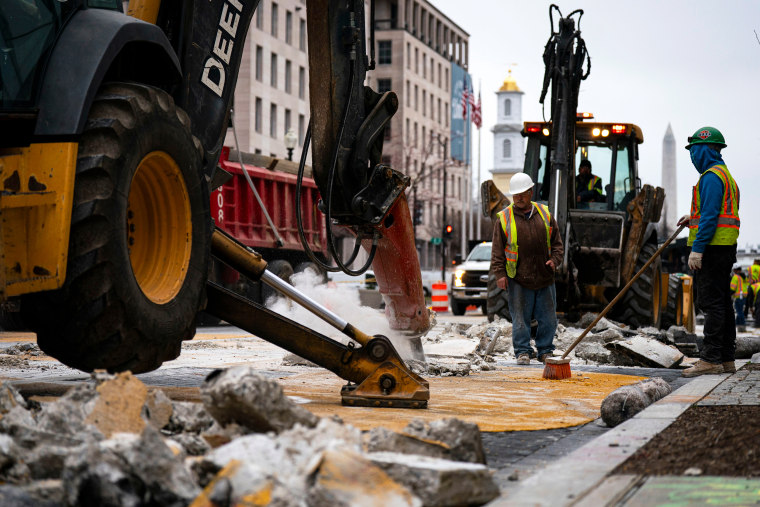How sad it was to see a 48-year-old Black woman in an Associated Press story linking skepticism that Black people belong in certain places to diversity, equity and inclusion efforts. She told a reporter that now if someone sees “a Black girl in an engineering course” they may believe she’s “only here to meet a quota.” But questions about Black people’s intelligence and qualifications aren’t a function of DEI initiatives; they’re a function of racism.
Because why does a Black person in an enviable position (or a difficult class) warrant an explanation? And to whom is an explanation owed?
Why does a Black person in an enviable position warrant an explanation? And to whom is an explanation owed?
According to a survey recently conducted by The Associated Press-NORC Center for Public Affairs Research, the percentage of U.S. adults who believe Black people in the U.S. face “a great deal” or “quite a bit” of discrimination was 60% four years ago but has now fallen to just below 50%. That story goes on to say: “Significant numbers of Americans also think diversity, equity and inclusion efforts, also known as DEI, are backfiring against the groups they’re intended to help.”
But it’s not true that DEI efforts are backfiring. What’s true is that people who feel threatened by a more diverse, equitable and inclusive society are firing back. They’ve worked, and not in secret, to make words such as “critical race theory” and “diversity,” “equity” and “inclusion” toxic; they’ve even laid siege to the word “woke” and turned it into a slur.
What’s worse is that these neo-segregationists have the president of the United States and the power of that office on their side. And the president has a phrase — “Make America Great Again” — that suggests that our progress is problematic and that we ought to be moving backward and not forward.
And moving backward is exactly what this country is doing if people are becoming more exercised about DEI initiatives than the discrimination DEI initiatives are intended to address.
The poll from four years ago that found 60% of Americans believed discrimination was a real problem was conducted less than a year after Minneapolis police murdered George Floyd and protests in this country and around the world called attention to racism in America. We should all want discrimination to be less of a problem, but the belief that it is diminishing doesn’t seem rooted in empiricism.
“What the National Urban League can safely say, unequivocally, is that economic, education, health disparities are still broad and wide in America,” NUL President and CEO Marc Morial said by telephone Thursday. “Black people are tracking on all of these indexes maybe about 74% of what white Americans are,” he said, “and that’s what’s material.” Further proof, he said, is in “the huge number of EEOC [Equal Employment Opportunity Commission] complaints, discrimination lawsuits, that are filed every single year,” and in the civil rights complaints filed against police.

Morial said he suspects that people are conflating discrimination with expressions of bigotry — that is, with ugly outbursts that may include the use of racial slurs or epithets. Such ugliness is rarely exhibited, though, when a Black applicant is denied a job or a loan or an apartment they’d like to rent. The pleasantness of the person doing the rejecting doesn’t mean there wasn’t discrimination. “Racism is a system,” Morial said. “Bigotry is an individual attitude.”
Derrick Johnson, president and CEO of the NAACP, said in an email Friday that the movement that followed Floyd’s murder “offered some hope” — but then “attacks on our community ramped up immensely” and “DEI — a positive initiative that gained incredible traction in 2020 — became demonized and politicized.” He said, “The once-disgraced president, whose time in office was marked by his racially-charged dog-whistles, was re-elected, and now — that same leader — is pushing to further gerrymander electoral maps and disenfranchise Black voters.”
Johnson said, “The notion that our community isn’t experiencing a great deal of discrimination could not be further from the truth — but it does say one thing: the extreme-right has been successful in communicating their narrative of America.”
There’s no doubt that the right-wing narrative has been persuasive to many people. But Johnson’s assertion that “people who don’t know what it’s like to be Black are buying that narrative” misses, I think, an important part of the story. The percentage of Black people who think discrimination is an issue has also trended down (from 83% in 2021 to 75% now).
I won’t argue with Black people who think things are improving — even if the data contradicts them — but the approximately 4 in 10 Black people who believe that DEI efforts are making things harder for Black people need to properly assign the blame for that increased hardship to the opponents of DEI initiatives and not to DEI initiatives themselves.
And they should give up the dream that there’s some set of conditions under which the accomplishments of, say, a Black woman engineer will be universally accepted as valid. Knee-jerk skepticism about certain people’s qualifications, which has a long history in this country, is one of the attitudes DEI programs are meant to address.
So how could getting rid of them make things better?
